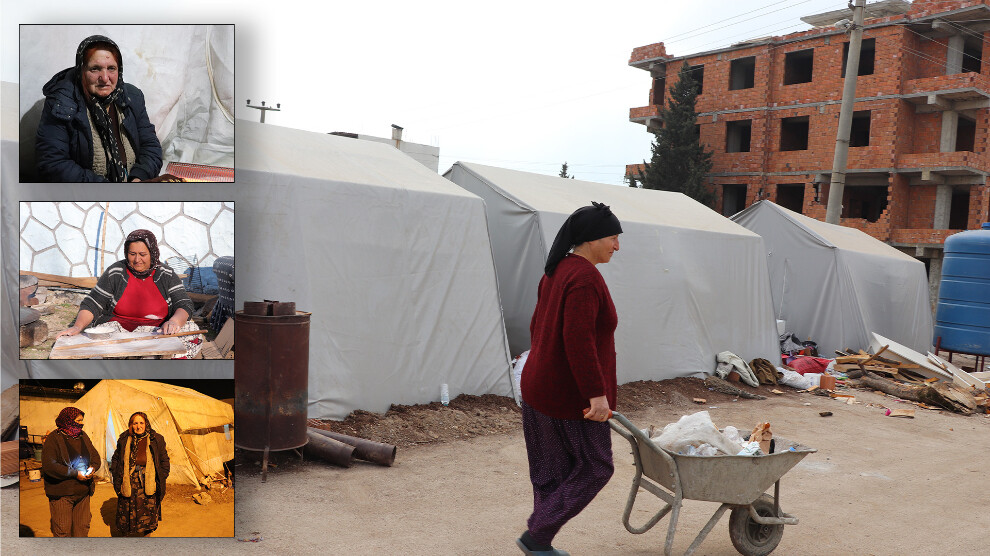Earthquake increases burden of women in Semsûr
In Semsûr, where the earthquakes have inflicted great wounds, women cannot even mourn the death of their loved ones. Struggling against the freezing temperatures, women bear many tasks, including laundry, cooking, cleaning tents and taking care of childre

MEDİNE MAMEDOĞLU
Semsûr (Adıyaman)- 18 days have passed since the Maraş earthquakes. The earthquakes have killed thousands of people and left millions of people homeless. Thousands of people spent the first three days on the streets or in cars in Semsûr (Adıyaman), one of the cities affected by the earthquakes. The earthquake survivors, who received tents, spend most of their time outside, using the tents only to sleep.
Women try to build life
The earthquake survivors still cannot access clean water and barely find food and hygienic supplies in the city. Women are most vulnerable during this disaster, suffering from urinary tract infections because they cannot reach clean toilets, water and pads. In addition, they have to bear many tasks, including laundry, cooking, cleaning tents and taking care of children. They have to wake up early in the morning to build their life although they need psychological support to cope with earthquake trauma.
They wash clothes by hand in plastic wash basin
Women who are struggling with many difficulties work the whole day. The women living in villages bake bread when they wake up and then carry clean water from far away. The women living in the city take water from the tanks and then boil water to cook tea for breakfast. Due to the water shortage, they have to wash clothes by hand in a plastic wash basin. They have to wash clothes, cook, clean the tents although they have not been able to take a shower for days. Due to gender roles, they suffer from the consequences of the earthquakes more.
‘We skip a meal not to wash the dishes due to the lack of water’
The house of Ayşe Eroğlu collapsed following the earthquakes. Her family of eight stay in a tent now. “We face many difficulties; there is no water, no toilet and no warm place to stay. We cannot sleep in the tent due to the freezing temperatures. We have to prepare breakfast and dinner in these unhygienic conditions. We skip a meal in order not to wash the dishes due to the lack of water. We suffer from many problems. Women have to bear many tasks, men also bear many tasks.”
‘We have to cook and wash the dishes but there is no water’
Hanım Yılmaz also stays in a tent with her family members. She reacts to the lack of electricity and water. She has to carry water to wash clothes and the dishes. “Before the earthquakes, we washed the dishes whenever we had time. But now, we can wash them twice a day due to the lack of water. Our house collapsed and now we are homeless living in a tent without water and electricity,” she said.
‘My children took my grandchildren outside of the city to protect them from the cold weather’
Rabia Çetin’s children took their children outside of the city to protect them from the freezing temperatures. Since she is an old woman, she stays in a tent in the city with her husband. “All residents in our neighborhood stayed in a tent for four days. We slept next to each other in order to protect ourselves from the cold weather. My children took my grandchildren outside of the city to protect them from the cold weather. My sister, who is a nurse, sent us this tent. If she had not sent this tent, we would have probably died of the cold weather. Our neighbors bring us food and water for us.”
‘We carry water to cook’
The women living in the village of Kom (Yayladamı) have to carry water to cook, wash clothes and the dishes. Türkan Çelik is one of these women. “We carry water from the fountain to cook because there is no water. We cook for 40 people every day. We work all day long,” she told us.
‘We have not taken a shower for days’
Nuriye Çelik also suffers from the lack of water and electricity. Speaking about the difficulties faced by them, she said, “We have not taken a shower for days due to the lack of water. Due to the lack of water, we cannot even wash clothes. We do not know what to do.”
